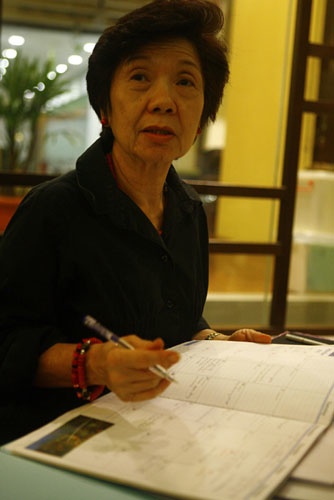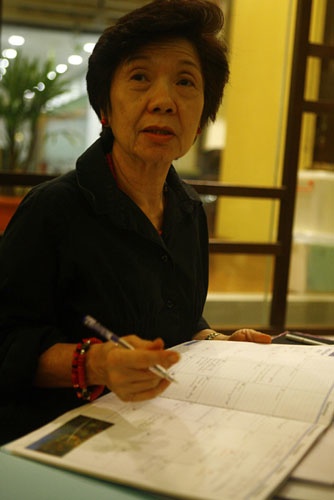
November 9, Kuala Lumpur, Malaysia —
When ministries deliberate over potential legislation in Malaysia, they will solicit the advice and recommendations of experts in the field. For children’s rights and issues, one of the most highly regarded authorities in Malaysia is Datuk Prof Dr. Chiam Heng Keng, who met with me on November 9 to discuss the current state of juvenile justice, and her efforts to collaborate with 2010 JusticeMakers Fellow Dato’ Yasmeen Shariff in revamping the system.
Prof. Chiam has built quite an extensive portfolio of experience working with children. She was the Professor of Social Psychology at the Universiti Malaya, specializing in child development, as well as adolescence and educational psychology. This research role eventually translated into a government position. When the government conceived Malaysia’s National Human Rights Commission, SUHAKAM, in 2000, she was asked to be one of the first commissioners, and held that seat for 10 years. She has also sat on numerous child-related committees in Malaysia, including the National Council on the Protection of Children, and done consulting work for government agencies such as the Department of Social Welfare (JKM) and the Ministry of Women, Family and Community Development. She has recently been selected as Malaysia’s representative to the newly established ASEAN Commission on the Promotion and Protection of the Rights of Women and Children (ACWC), and chairs the government-appointed Committee on Child-Friendly Places of Detention with Dato’ Yasmeen.
Her diverse and elaborate involvement in children’s issues has revealed to her a fundamental shortcoming in the way certain departments within the Malaysian government have dealt with children.
“If you want to support children and prepare them to contribute to society, you must fully understand them – understand the way they deal with emotions and the motivations behind adolescent behavior. And many people responsible for coping with troubled children simply don’t have the specialized knowledge to deal with them.”
Prof. Chiam began working with JKM in the early eighties, and upon her arrival, urged the department to hire social psychologists to staff their offices. These new additions would, ostensibly, better equip the welfare officials to handle children’s issues.
Only around 2000 did JKM finally start recruiting psychology officers to their agency. But even with these hiring moves, Prof. Chiam reckons, inadequacies continue to hamper the department.
“These psychology officers [in JKM] do not have the expertise or depth of knowledge on children and adolescents to institute effective programs to rehabilitate child offenders and assist enforcement officers in other agencies/departments in handling them.”
Another issue of concern for Prof. Chiam is the shortage of social psychologists and welfare officers to manage JKM’s responsibilities outlined under the 2001 Child Act.
“Welfare homes are often left without resident/full-time trained social psychologists. And even more alarming is the shortage of welfare officers, which results in instances where no officer is present at the time of arrest for a child, which is mandatory at all times under the Child Act.”

Prof. Chiam attends a meeting for the government-sponsored Committee on Child-Friendly Places of Detention (Photo by Jeffrey Bright)
This lack of training is not endemic to JKM. Serving on SUHAKAM, she has had the opportunity of working with a wide range government officials, and seen first-hand the shortcomings that still plague Malaysia’s juvenile justice system.
“Besides social welfare officers, other justice sector actors like magistrates, judges, law enforcement and prison authorities have to better grasp the importance of specialized, child-focused training when dealing with children. This group of people, especially the judiciary wing which handles youth, has to have specialized training that enables them to understand children and their rights to justice.”
Prof. Chiam’s call of duty as a children’s rights advocate necessitates this sort of criticism; without it, progress could not occur. Nevertheless, she makes an important distinction between a defective system and the people that work within it.
“There really are great people within these agencies working on a daily basis to help children. The passion and dedication is there. But without the proper training, resources and mechanisms in place, I am a bit skeptical.”
And this is why Prof. Chiam endorses Dato’ Yasmeen’s project. They share a vision of transforming how Malaysia’s judicial system handles children – away from a punitive philosophy and towards a restorative approach. This paradigm shift will focus on and magnify the deep social and familial sources motivating juvenile delinquency.
“In these [juvenile] cases, the most important thing is the child, and rehabilitating all children involved. When you detain a child, even when the detention is in a reform school, you overlook the real problem of why he has gotten to that place. What we want to do is rehabilitate the child so he understands the consequences of his actions and position him to reintegrate back into and contribute to his community.”
Dato’ Yasmeen’s proposal of diversion will encourage alternative methods to detention for children, including family mediation and counseling. This emphasis, Prof. Chiam argues, will require the government to invest more resources in child-related training for judicial, law-enforcement and welfare officials. More resources will usher in better-trained specialists, who will utilize approaches to juvenile delinquency that will be more valuable to the offender, victim and affected community.
Fast-forward 3-6 months, when Dato’ Yasmeen’s proposal is on the table of Malaysia’s cabinet of ministries. For someone with over 30 years of experience dealing with children, the issue will be a no-brainer.
“For me, it breaks down to this simple statement,” concludes the Prof. Chiam. “Why waste a life? Right now, we are sending children into detention prisons and reform homes without considering carefully how we can make them better citizens. We can do this by empowering these children to realize the consequences of their actions: the grief or physical and psychological suffering they inflicted upon their victims and families.”
“Imprisonment and detention may also turn them into hardened criminals. We need to motivate and drive our children to become better people. Diversion will exercise alternatives that will empower, rather than shackle these children.”